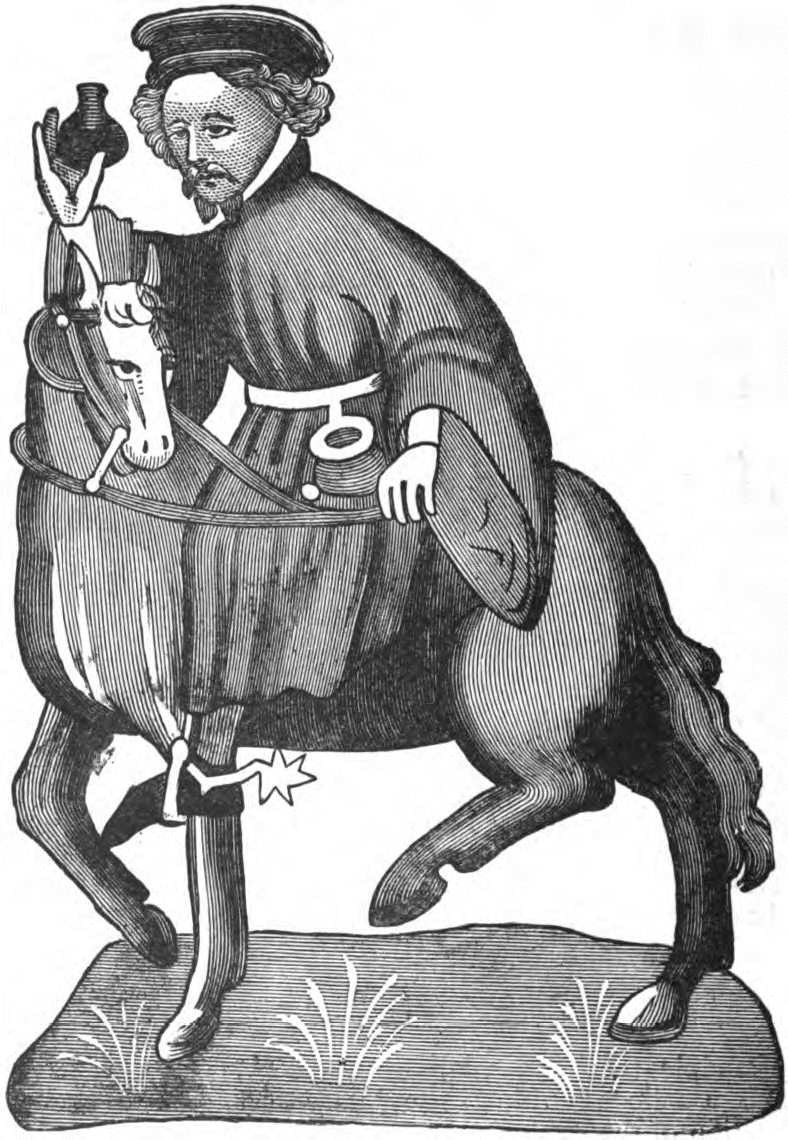

THE MANCIPLE
A Manciple (the derivation of the word seems uncertain) is a servant of a college or inn-of-court who purchases provisions under the direction of the cook and the steward. Chaucer's Manciple was attached to 'a temple,' i.e. to one of the two inns-of-court (Inner and Middle Temple) which occupied the buildings of the old Knights Templar in the Strand at London. In an account of the Middle Temple (quoted by Robert Pearce, in his Guide to the Inns of Court (1855 ed., p. 276) from a manuscript of the time of Henry VIII. (Cotton Ms. Vitell. c. ix.), the wages of the steward are given as 53s. 4d., the chief cook received 40s., while "the manciple, or steward's servant, his wages by the year" were 26s. 8d. A note informs us, ''also at Easter the cook's manciple has in reward of every gentleman of the house I2d. or therabouts," and if this refers to the same person his wage must thus have been considerably increased. As Chaucer, however, plainly hints, the Manciple had ways of making money independently of his wages and tips. In the Talks by the Road the hint is repeated, for when the Manciple lectures the Cook on his drunkenness, the tolerant Host remarks:
| "But yet, Manciple, in feith thou art to nyce1 Thus openly repreve hym of his vice; Another day he wole, peraventure, Reclayme thee2 and bringe thee to lure,— I meene he speke wole of smale thynges, As for to pynchen at thy rekenynges: That were nat honeste,3 if it cam to preef. No, quod the Manciple, that were a greet mescheef! So myghte he lyghtly bryng me in the snare”; |
1 to nyce, too foolish. 2 reclayme thee, etc., pull you up short. 3 that were nat honeste, that would not be creditable.
and to propitiate the already drunken Cook he gives him a draught of wine from a 'gourd' he carries with him. According to Mr. Saunders it is this gourd or bottle that he is carrying in his hand in the Ellesmere picture, and Mr. Saunders is probably right. His coat is blue; its lining, as well as the cape, hose, and purse, red.
567. of a temple, i.e. of an inn of court, or college for lawyers. After the dissolution of the order of the Knights Templar in 1312 the house which they had built for themselves in the Strand in the reign of Henry II. was first bestowed on some royal favourites and ultimately by Edward III. on the Knights Hospitaller of S. John, who let it, it is said for a rent of £10, to the teachers and students of law who had previously occupied Thavies Inn, Holborn. The buildings were attacked and the lawyers' records destroyed by Wat Tyler, but the Temple is still occupied by the lawyers at the present day.
570. took by taille, i.e. on credit. The ' taille,' or tally, was a stick marked with notches to indicate payments. When split down the middle it provided debtor and creditor with identical records. The use of tallies in the Exchequer for certain purposes survived till about 1812.
581. by his propre good, on his own income.
582. wood, mad.
586. sette hir aller cappe: set the caps of, i.e. befooled, them all. Hir aller is the genitive plural. We find the phrase again in A 3143, 'a clerk hath set the wnghtes cappe,' and in A 3911 the similar one, 'somdeel sette his howve.' A very slight alteration in the tilt of a hat will make the most respectable citizen look ridiculous.
--o--
These notes are reproduced verbatim from Alfred W. Pollard, Chaucer's Canterbury Tales: The Prologue, London: Macmillan, 1903. The book is in the public domain and available for viewing and download from Google Books. Although the book is old, the notes are enlightening and accurate. Nevertheless, users doing detailed research on aspects of the General Prologue should, if possible, also consult more recent notes in print publications such as The Riverside Chaucer, ed. Larry D. Benson, 3rd ed., Boston: Houghton Mifflin, 1987.